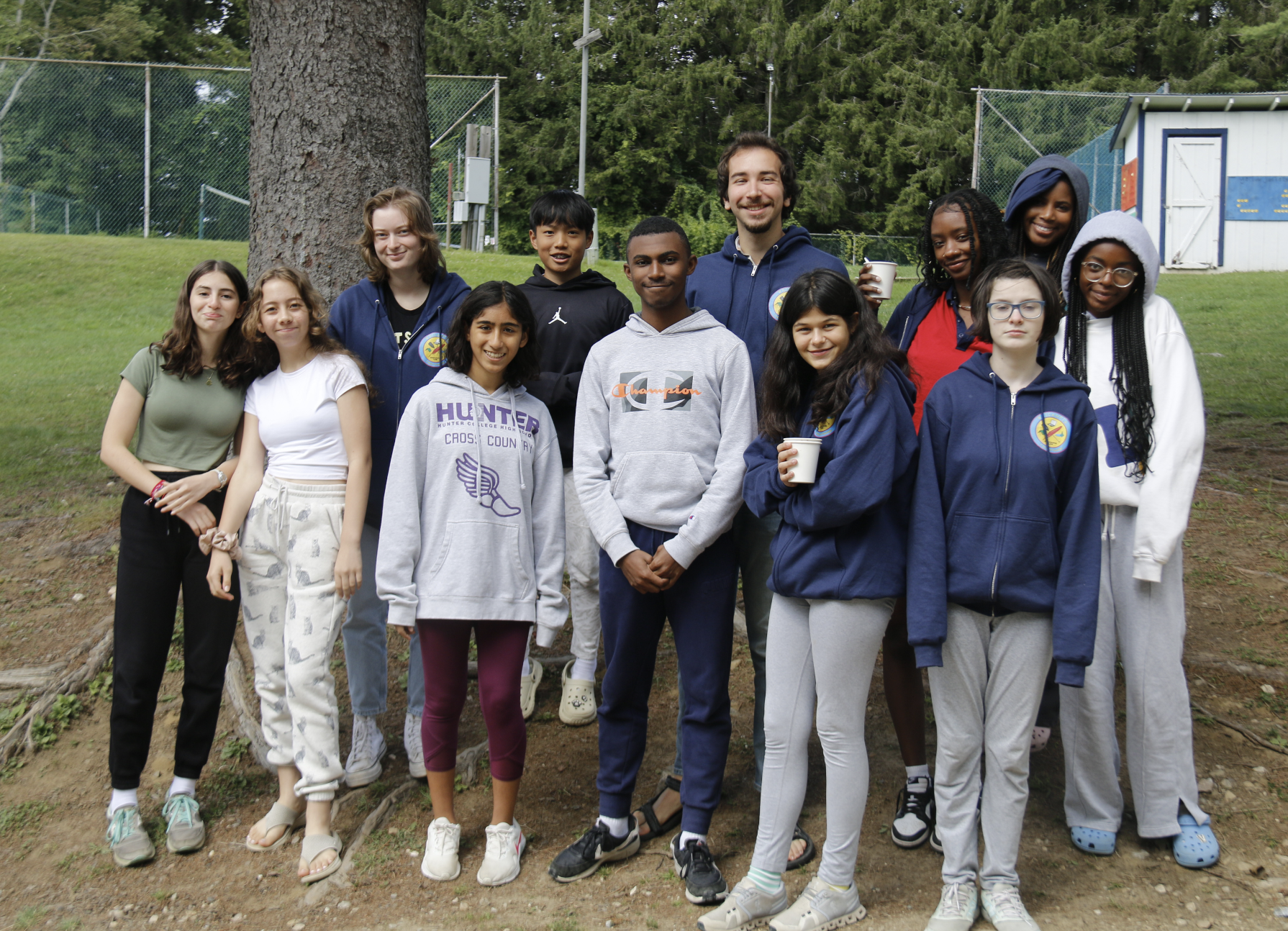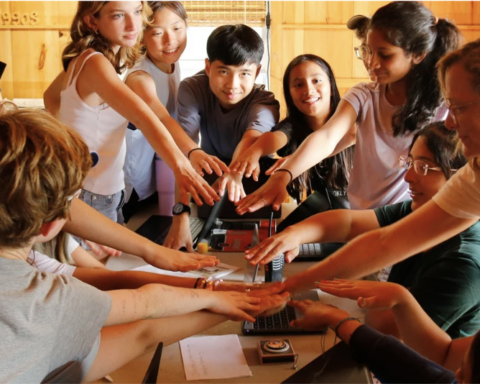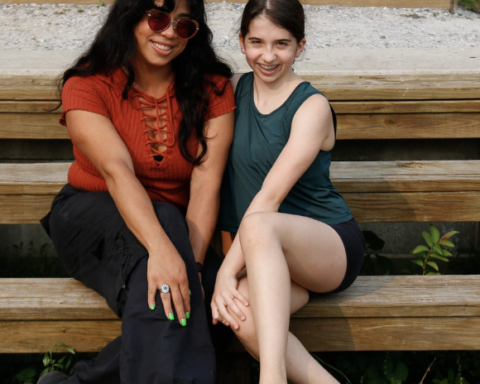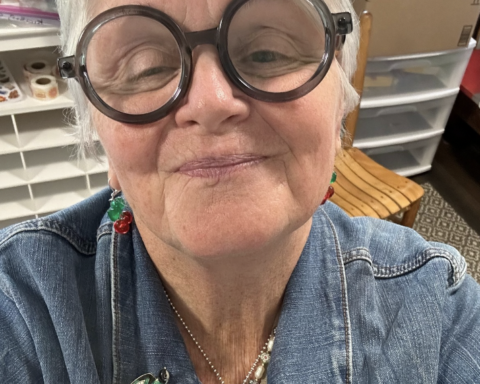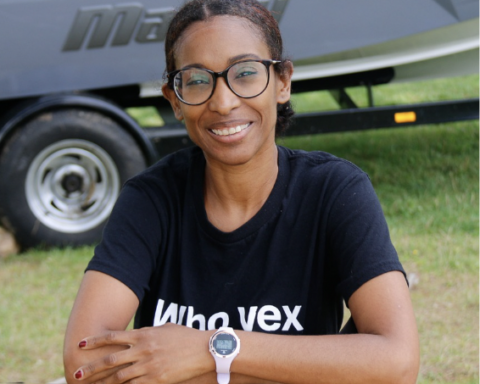By Sophie Katz, Age 16
Variation has always intrigued me – diversity is the reason why the world is still running (somewhat) smoothly. If we were all lawyers, we would have nobody to run the government or preserve the environment. If we were all part of the same country, there would be no new places to experience. If we all cooked pasta every day, sushi would fade into the dust. To me, WriCampia is a small encapsulation of an amazing community, and even in my two summers attending, I can confidently say that WriCampians are a brilliant group of people both in terms of personality and diversity. I also find that WriCampians, and really most people, if you give them a chance, are more open about culture than you’d expect. Although there’s a notable stigma around the idea of difference, which needs to continue to be worked on, the world has slowly but surely started to recognize the beauty in our many walks of life. To reflect on this, I decided to step out of my comfort zone by asking fellow Wricampians to reflect on our cultures together.
I found Alex S., 16, busily preparing for the next day’s Wrichella festival, where in between song sessions she shared her cultural story with me. Half of Alex’s family is Jewish, while half is Mormon. Although she is atheist, she identifies more closely with the Jewish side of their family due to their closer proximity. “The sides of my family are so different, so I didn’t inherit a lot of culture,” she said.
Alex experienced the joys and challenges of being part of a minority culture. “My acting teacher gets really excited when it’s a Jewish holiday and she’s like ‘Tell us about what Passover is!’” Alex excitedly said.
Despite the interest, the teacher unfortunately, but understandably, missed the fact that food needed to be unleavened for it to be Passover friendly at one of their meetings that took place over the holiday. As Alex said, “It was the thought that counted.”
Alex also experienced negative feelings toward her culture, although they weren’t specifically directed at her. “People had put swastikas on it,” Alex said of her New York suburban preschool that had been vandalized horribly “a few years ago.”
She also added that, “people are equating Jews and Israel which is not necessarily always true,” expressing an emphasis on the difference between ethnic groups or religions and country government policies. “You have to walk on eggshells if you don’t know a person,” she said when asked about whether she’s comfortable opening up about her culture.
Despite these meaningful memories and grappling with antisemitism at her old preschool, Alex sees religion as a less spiritual and more cultural aspect of her life. Interestingly, her parents would be “upset” if Alex was more involved in religion-related endeavors. “They encourage creativity,” she added. Alex sees WriCampia as a reminder that it’s okay to have a strong sense of culture but also to be more disconnected. “There are so many diverse perspectives, and to be hedged into one community can be limiting,” she shared.
Alex also added an important little-known fact about Judaism. “A lot of [my] Christian friends say it’s looked down upon to ask questions about religion but in Judaism it’s required,” she said. “If you want to be a Rabbi or anyone in the synagogue you have to ask questions and have your own interpretation.”
This encouragement to ask questions has led Alex to “be more progressive than [her] parents.” Unless one is orthodox, being Jewish is usually invisible to the naked eye. Even so, it can still come with outsider-like feelings in settings such as public school. Alex was used to a preschool that emphasized Jewish holidays such as Passover, Hanukkah, or Rosh Hashanah. In preschool, Alex initiated Jewish prayers with her family, but she no longer recalls them.
In contrast, her public school was home to mostly Catholic and Protestant students who emphasized Christian holidays. “I was like, ‘Where are the Menorahs?’” Alex joked.
In addition to holidays, Jewish foods are notable aspects of Alex’s culture. She expressed excitement for square knishes, but she “doesn’t stand by” gefilte fish, the popular Passover staple.
Alex also shared a story regarding her dad’s experience being Jewish when he was little. “His class was performing a scene from the Bible,” she said. “The teacher [asked] who [wanted] to play Joseph, and he was thinking that because Judaism is based on the old testament, that it was about the Joseph [from] the technicolor dreamcoat [story].”
To Alex’s dad’s surprise, the Joseph they were referring to was Jesus’s father. This was a ‘formative experience’ for Alex’s father as he ended up minoring in religious studies to learn about other religions.
During night electives, the packed dining room is a nightly home for WriCampians. There, I found both Sheq R., 13, and Cielo R., 11, enjoying various activities such as balloon play and arts and crafts. Sheq considers Islam and Bangladeshi customs to be two important parts of his culture. Sheq cited few positive reactions to his culture apart from Islam’s status to some as a “cool religion.” Unfortunately, he also described being associated with 9/11, but he confirms that “we don’t support him [referring to the perpetrator of the attacks].”
Eid is a notable Islamic celebration that Sheq takes part in. WriCampia helped expand his sense of other cultures. “I used to think [every culture] was all based around the same thing,” he said.
Although Sheq faces stereotyping in “some parts of New York” where he has been “excluded” because of his religion, he remains optimistic. “There’s always good people out there that’ll accept you,” he added.
The Bengali language and prophets passed down from his parents played a role in shaping his childhood.
When asked about how his culture impacts his political views, Sheq said that he disapproves of Donald Trump. “Kamala’s going to make everything easier,” he said. Take his word for it: “I don’t really care what their culture is – good personality is all that really matters.”
Cielo R., a Middle Camper, is Mexican-Peruvian-American. She’s “half Christian and half Catholic,” but she emphasizes that her parents aren’t fond of religion. While Cielo is proud of her culture, she has faced racism and xenophobia. Some of the people Cielo has encountered “don’t like to hang out with Hispanics.” This then prompts her to make Hispanic friends “so we can talk about our country.”
Cielo’s parents put a spotlight on self defense: “They told me to tell them everything I have been through,” she said. “She [Cielo’s mother] will congratulate me if I have a fight in school.”
In addition, Cielo’s parents encourage her to speak Spanish inside the home and utilize English while interacting with the outside world. Cielo is also a polyglot-in-training – in addition to English and Spanish, she also speaks Quechua (an indigenous Peruvian tongue), in addition to some French, Korean, and Japanese.
“Sometimes people like Mexicans but they don’t know about Peruvians,” she shared. Cielo also explained that she had met multiple Machu-Picchu skeptics. “Some people don’t think they made it because it’s so big,” she said, adding that she helped the doubters eventually get to the right conclusion.
Ashton, 12, joined filmmaking during daily electives, where he explained during an interview that Hong Kong is the center of his culture. “My family has been supportive and they have helped me every step of the way,” he told me. He shared that something unique to his culture is the practice of visiting family which he takes part in regularly. He also shared some interesting tidbits: the number 4 is considered unlucky and he speaks some Cantonese!
Adrian, 14, was flipping on the trampoline in Danbee’s full-scale gymnastics space, but he didn’t flip out when I asked him for an interview. Adrian is Chinese, and the most positive feedback he hears regarding his culture is that people are fond of the food and holidays featured in Chinese culture. “A lot of holidays and foods are based on Confucian or Taoist religion,” he said.
A moment later, Adrian excitedly shared multiple Chinese traditions he celebrated. As a special Chinese New Year tradition, Adrian’s family tunes into “a Chinese broadcasting network” – it’s “our movie night basically.” In addition, his mom encourages him to study the Mandarin language. In our last moments together, Adrian shared a story that had been passed down from his parents about an emperor who tries to find his successor. To do this, he hands out seeds to kids who are instructed to try their hardest to bloom a flower. However, one character goes home and takes care of their seed — but nothing happens. When it comes time to show the emperor the flowers, this character has no beautiful flower like all the others. This ends up being a reward as the character with no flower was the only honest one (the rest of them had cheated in order to bloom their flowers). The story encourages young children to be honest from an early age.
Although most of the people I interviewed were campers, I also had the privilege of talking to Laura, a camp counselor who has been working with WriCampia for two years. Laura was raised in Cuba and Florida, and immediately described her community as “loud” and “happy”.. According to Laura, “everybody likes to party with the Cubans” because of their infectious enthusiasm. Growing up in Florida, she noted no problems due to Floridians’ nature of embracing culture. “Everybody always compliments my accent for some reason,” she added. Growing up in a communist country, Laura was only allowed one religious choice: Catholicism. In addition to the lack of religious freedom, Cuba also poses a lack of career-related freedom. Laura’s mother wanted to be a marine biologist, but she had to become an engineer instead.
“When my parents and I first became citizens we chose the independent [political] party right away because it meant more freedom which is something you don’t have in Cuba,” she said. Although Cuba may not have been encouraging, Laura’s parents were. “Sometimes I wish they had told me when I was doing something wrong,” she joked when being asked to describe her parents.
One unique aspect of Cuba is “student day” on April 4th. Laura described a night cookout with students frantically running around asking for tasty Cuban soup. “Not sanitary, but fun,” Laura added. While making friends, she tends to gravitate towards Hispanic people, saying that “we always seem to find each other.” She shared struggles with her neighbors, such as doing “a lot of things on the down low to get food.” Laura emphasized how helpful her fellow Cubans were and how she comes to understand her culture even more as the years go on.
Sanara, 13, was working on impressive artistic endeavors when I found her in the cooking room. Sanara considers herself to have “no religion,” but she celebrates a mixture of Christian and Indian holidays due to her father being Catholic and her mother being Hindu. One notable holiday was Rakhi, where participants “exchange bracelets and tell each other that we’ll always protect each other and stuff.” Sanara was excited to provide insight regarding some other holidays she celebrated, such as Diwali parties set up by her mother.
Significantly, Sanara recalled a story “about Diwali” found in the Ramayana. She wanted to be sure not to disappoint anyone who knew the story, so if you’re interested in the specifics be sure to research the story more on your own. Here is the story as typed by Sanara:
Rama and his wife Sita and his brother Lakshmana are banished into the forest for 14 years. One day a demon disguised as a golden deer appears, and Lakshmana tries to get it. Ravana, the evil character with 10 heads, makes it seem as if Lakshmana is in trouble. Rama draws a circle around Sita with chalk, and says she’ll be safe inside the circle, and tells her not to leave it. Rama leaves, and Ravana pretends to be a beggar. Sita leaves the circle to help the beggar and gets captured. Then, Rama, Lakshmana, and Hanuman, a monkey who can fly, try to rescue her.
I found Madeleine, 17, near the dining room during night electives as I was looking for one last person to interview. Similarly to other WriCampians such as Sanara, Madeleine does not have a direct religion. Her dad’s side of the family is Southern Baptist and Quaker, and her mom’s side is not religious. Lamentably, Madeleine has been a victim of cultural bullying in two ways. “I’ve been made fun of for wearing a bonnet to sleep,” she shared. “I’ve been made fun of for ‘not being Black enough.’” Having to grapple with two different harsh mentalities is one aspect of difficulty regarding her cultural identity. “Sometimes I feel insecure for not having a strong cultural background that sets me apart,” she said. “I think that the really intense evangelical Christianity has been folded into African American identity which has made it difficult for me to access that part of myself because I’m not religious,” she reflected. Additionally, her dad had “shied away from Black American culture a little bit,” causing Madeleine to feel further disconnected to her cultural identity. One legend that Madeleine grew up hearing was that “when there’s thunder [that’s] the devil beating his wife.” She added that the theory was “dumb,” but it was still a memorable one for her.
Thankfully, WriCampia is a safe space for Madeleine to discuss her identity and values. According to her, WriCampia is a haven of “extreme open mindedness and compassion.” In addition to being a safe space, Madeleine finds the religious services that WriCampia provides interesting. “As someone who’s not religious it’s a reminder that people who are experience their weeks differently,” she said, referring to the Shabbat and Church services that had taken place days earlier. She’s also adamant about breaking the stereotype that Americans “are ignorant of other people’s culture.”
Through learning about Jewish, Christian, Peruvian, Mexican, Cuban, Islamic, Hindu, Hong Kong, Chinese, and nonreligious cultures, I was impressed not only with my fellow WriCampians’ diversity but also their willingness to open up about themselves. Out of everyone I talked to, I would be the most similar to Alex – Jewish, but not quite religious. I also lack a prominent country to use to answer people if they ask where I’m from: my grandmother’s Romanian, and I thought that was Italy when I was little, so I ended up doing an art project about Italy instead of Romania!
I hope that you were able to see yourself represented in these WriCampians’ stories or even develop new knowledge regarding a culture you weren’t as well-versed in. To finish off with a quote from Madeleine, culture may not be as frequently talked about because “people are afraid of being made fun of and being called racist or perpetrating something they didn’t mean to.” Despite many people still following this logic to shy away from discussing culture, WriCampians continue to break the silence.
